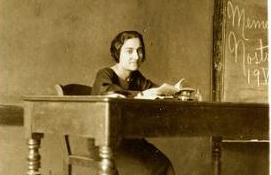Question of the day: Is it possible that I've been applying theories I never even knew existed? I suppose so, or perhaps I knew on a subconscious level, having absorbed the knowledge through years of teaching and physical proximity to teachers who actually took education courses in college and grad school.
I think it's been established, in any case, that I'm a humanist-constructivist-social learning pedagogue. Rather than a hyphenated name, I'd prefer to blend all three, but there's no way to do this gracefully. Huconsoc. Humasociaconst. That one has a certain ring to it. Sort of.
I still have a way to go before I understand who Gagne, Bruner, Skinner, Bandura, Carroll, Vygotsky, and the rest of them actually were and what they thought. I mean, I get the basics at this point, and maybe that's enough, at least for now.
On a more concrete note, it was helpful to trace the use of a constructivist and social learning approach in a particular unit that I teach, namely listening and interpersonal communication skills in Applied Communication 2. I think that looking at teaching approaches and sequences closely can help me to be more deliberate about what I do, and more effective as a teacher as a result.
Wednesday, February 10, 2010
Sunday, February 7, 2010
Making Connections
This week in my Educational Psychology class, we are analyzing and comparing several learning theories, namely behavioral, humanistic, cognitive, constructivist, and social learning theory. I'm a humanist at heart, but I've learned that to reach my students, I need a range of other approaches besides merely standing on my desk and shouting out "O Captain! My Captain!" (Yes, Dead Poets Society was my favorite film for many years.)
Come to think of it, though, that would probably wake up the after-lunch Applied Comm 1 crowd. . .
I've long known that most of my students have different learning styles than I do, and as a head-frequently-in-clouds poet teaching technical college students who are concrete thinkers and hands-on learners, one of my ongoing challenges is to put myself in my students' shoes and ask, "What's their hook going to be into this material? How can I connect this competency to what they care about, and how can we reach it in a way that fits with how they learn?"
Studying learning theory puts names to ideas I've already been aware of on some level as a practicing teacher, and this is an empowering process. For example, based on my understanding, I use a behaviorist approach through a point system; there's a direct, almost immediate reward or consequence for completing or not completing work. I've learned to "break it down" as a means of reaching loftier goals.
In terms of how studying these theories will influence my teaching now and forevermore, I would like to more deliberately utilize social learning theory in my writing classes. I have found that student success rates are higher when students have a sense of community in a writing class, whether it's in person and online. While I focus greatly on group dynamics and class bonding when teaching Oral and Interpersonal Communication, I plan on being more intentional about creating community in the writing classroom.
Come to think of it, though, that would probably wake up the after-lunch Applied Comm 1 crowd. . .
I've long known that most of my students have different learning styles than I do, and as a head-frequently-in-clouds poet teaching technical college students who are concrete thinkers and hands-on learners, one of my ongoing challenges is to put myself in my students' shoes and ask, "What's their hook going to be into this material? How can I connect this competency to what they care about, and how can we reach it in a way that fits with how they learn?"
Studying learning theory puts names to ideas I've already been aware of on some level as a practicing teacher, and this is an empowering process. For example, based on my understanding, I use a behaviorist approach through a point system; there's a direct, almost immediate reward or consequence for completing or not completing work. I've learned to "break it down" as a means of reaching loftier goals.
In terms of how studying these theories will influence my teaching now and forevermore, I would like to more deliberately utilize social learning theory in my writing classes. I have found that student success rates are higher when students have a sense of community in a writing class, whether it's in person and online. While I focus greatly on group dynamics and class bonding when teaching Oral and Interpersonal Communication, I plan on being more intentional about creating community in the writing classroom.
Subscribe to:
Posts (Atom)
